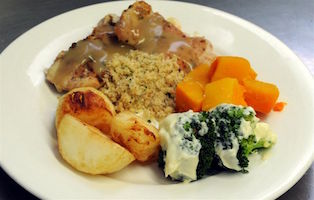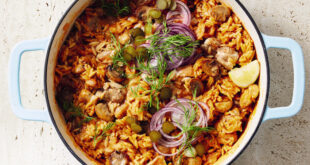 Food is such an important part of life – it nourishes us, entertains us and provides a social opportunity to enjoy with friends and loved ones.
Food is such an important part of life – it nourishes us, entertains us and provides a social opportunity to enjoy with friends and loved ones.
One of the changes families can notice in an older family member, particularly one who is living alone, is that they begin to cut corners when it comes to food – either in a bid to save money or as a result of fatigue of impaired function.
The World Health Organisation has identified that the ageing population has specific nutrient needs. For example, while requirements for some nutrients may be reduced, some data suggest that requirements for other essential nutrients may in fact rise in later life.
Older people can be particularly vulnerable to malnutrition. Both lean body mass and one’s base metabolic rate decline with age, so to maintain a consistent weight, an older person’s energy requirement per kilogram of body weight actually reduces. However, certain age related diseases can be controlled or improved through lifestyle factors including nutrition, so nutrient dense food is vital.
Many of the diseases suffered by older people (for example cardiovascular disease, diabetes and osteoporosis) can be diet affected.
Increasingly in the diet/disease debate, the role that micronutrients play in promoting health and preventing disease is receiving attention. Micronutrient deficiencies are often common in elderly people due to a number of factors such as their reduced food intake and a lack of variety in the foods they eat.
Micronutrients rich food also tends to be expensive, which can be a factor in their lower consumption.
At Radius Care, Dunedin chef Peter Kennett designs and oversees the menus in all 22 facilities.
Managing director Brien Cree, says that is the best way to ensure high quality meals and snacks for their residents, five times a day, which receives feedback like “it’s fantastic.” When it comes to aged care, that is not the sort of response which is generally expected when it comes to food.
“I’m anti-contract cooking. At Radius Care, we control all aspects of the process – food is purchased on our account and managed by us.’
“By managing it yourself you can do a better job,” he says.
Mr Kennett said there was some flexibility for local Radius chefs. For instance, swedes on the menu in the South Island were not seen at North Island facilities.
“We know that food is something we all look forward to in life, and this never really changes no matter how old you are,” says Mr Cree. “It’s our desire to create a warm, homely environment where our residents enjoy living.”
Dietitians check the menus to ensure they meet nutritional requirements, but the biggest measurement tool Radius Care relies on is “customer” satisfaction. “When we get that great feedback, we know we’ve hit the right mark with our meals,” he says.
Click here to read more on this topic.









Join the Discussion
Type out your comment here:
You must be logged in to post a comment.